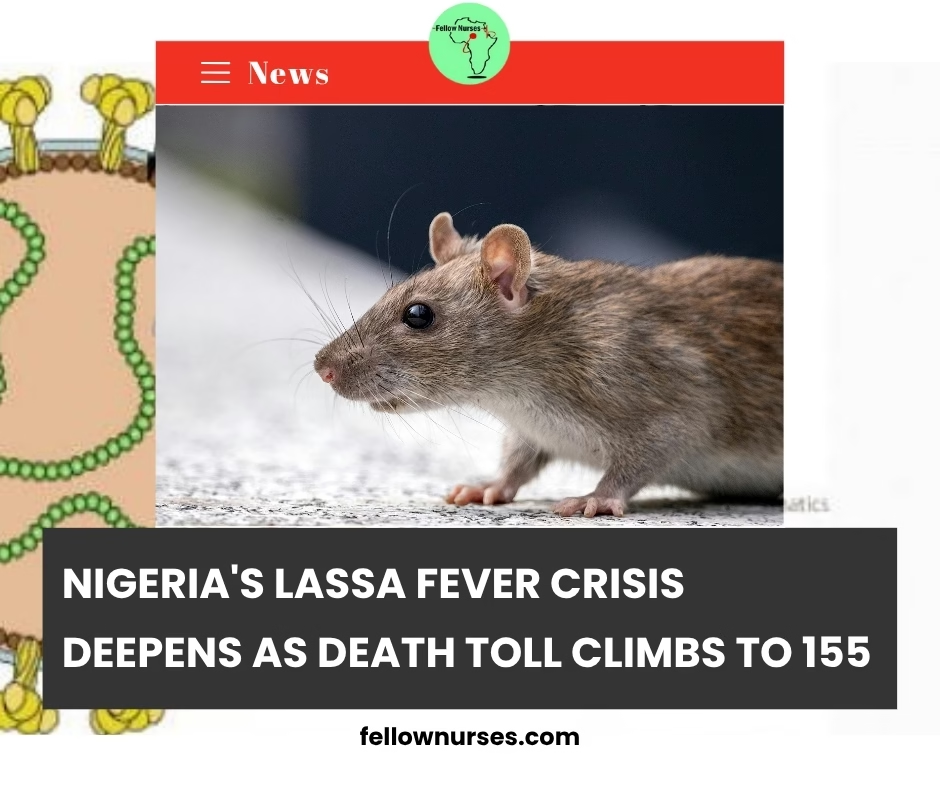Fellow Nurses Africa News, Lagos Nigeria. 06 August, 2025.

Health authorities report 18.9% fatality rate as outbreak spreads across 21 states
Nigeria is grappling with an escalating Lassa fever outbreak that has claimed 155 lives from 822 confirmed cases so far this year, according to the latest situation report from the Nigeria Centre for Disease Control and Prevention (NCDC).
The case fatality rate has climbed to 18.9%, representing a concerning increase from the 17.1% recorded during the same period in 2024. This deterioration comes despite steady infection rates, suggesting the virus may be proving more lethal rather than simply spreading faster.
Five States Account for Nearly 90% of Cases
The outbreak remains heavily concentrated in Nigeria’s endemic regions, with five states bearing the brunt of infections. Ondo leads with 32% of all confirmed cases, followed by Bauchi at 23%, Edo at 17%, Taraba at 14%, and Ebonyi at 3%. Together, these states account for 89% of the national caseload.
The geographic spread, however, continues to expand. Cases have now been reported across 21 states and 105 Local Government Areas, indicating the virus’s persistent challenge to containment efforts.
In the most recent reporting period—Week 29 from July 14-20—health authorities confirmed 11 new cases, all emerging from Ondo and Edo states, the two regions that have consistently reported the highest infection rates throughout 2025.
Young Adults Most Vulnerable
The disease is disproportionately affecting Nigeria’s young adult population, with those aged 21-30 representing the largest demographic of confirmed cases. This pattern raises particular concerns about the outbreak’s potential economic and social impact on the country’s most productive age group.
Systemic Challenges Hampering Response
Health officials cite multiple factors contributing to the elevated fatality rate. Delayed reporting remains a critical issue, often compounded by poverty-driven treatment delays as families struggle with healthcare costs. Poor environmental sanitation in affected communities and low awareness about the disease’s symptoms continue to undermine prevention efforts.
The NCDC has identified sluggish health-seeking behavior as a particular challenge, with many patients arriving at healthcare facilities only after their condition has significantly deteriorated.
Understanding Lassa Fever
Lassa fever is an acute viral hemorrhagic illness endemic to West African countries including Nigeria, Liberia, Sierra Leone, and Guinea. The disease spreads primarily through contact with the excreta of infected Mastomys rats, though human-to-human transmission is possible, particularly in healthcare settings with inadequate infection control measures.
Early symptoms include fever, headache, sore throat, nausea, vomiting, diarrhea, muscle pain, chest pain, cough, and in severe cases, hearing loss. The non-specific nature of these symptoms often leads to misdiagnosis, contributing to delayed treatment.
Response Efforts Intensify
The NCDC has launched targeted environmental response campaigns in high-burden areas, focusing on rodent control and improved sanitation. Health authorities are also intensifying surveillance and diagnostic efforts while maintaining close collaboration with the World Health Organization.
Public health officials stress the critical importance of early detection and treatment, urging Nigerians to seek medical attention promptly when experiencing fever and other early symptoms.
As Nigeria enters the height of its rainy season—a period that typically sees increased rodent activity—health authorities remain on high alert for further escalation of the outbreak.
The crisis underscores the ongoing challenges facing Nigeria’s healthcare system in managing endemic diseases while simultaneously addressing multiple health emergencies across the country.
Lassa fever was first identified in Nigeria in 1969. The country typically records between 1,000-1,500 confirmed cases annually, making 2025’s figures consistent with recent trends, though the elevated fatality rate remains a significant concern for health authorities.
Fellow Nurses Africa is the independent voice of African Nursing, we educate, inform and support the nursing profession.










